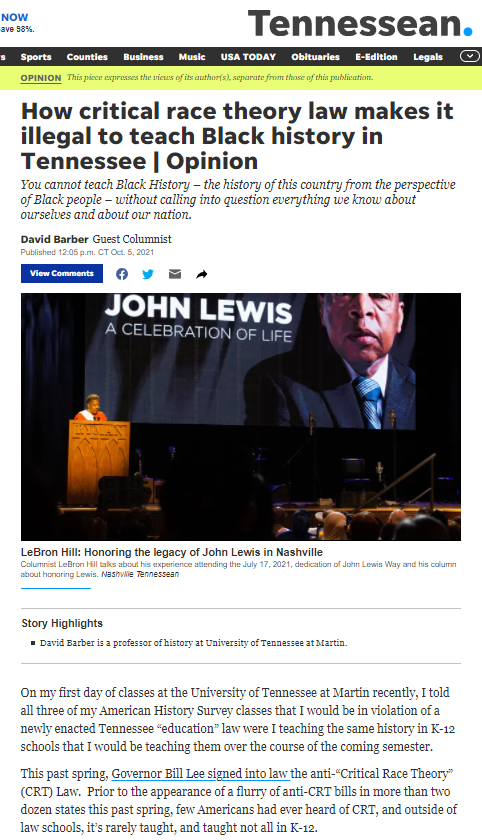STORY UPDATED: check for updates below.

Does a 2021 Tennessee law make it illegal to teach Black history in the state? No, that's not true: While the law does not ban the teaching of Black history, or any ethnic group's history, it greatly restricts what public school teachers can discuss in Tennessee classrooms about racism, white privilege and unconscious bias.
The claim appears in an opinion article (archived here) written by guest columnist David Barber, a history professor at the University of Tennessee at Martin. Published on The Tennessean website on October 5, 2021, it's titled "How critical race theory law makes it illegal to teach Black history in Tennessee." It opens:
On my first day of classes at the University of Tennessee at Martin recently, I told all three of my American History Survey classes that I would be in violation of a newly enacted Tennessee 'education' law were I teaching the same history in K-12 schools that I would be teaching them over the course of the coming semester.
This past spring, Governor Bill Lee signed into law the anti-'Critical Race Theory' (CRT) Law. Prior to the appearance of a flurry of anti-CRT bills in more than two dozen states this past spring, few Americans had ever heard of CRT, and outside of law schools, it's rarely taught, and taught not all in K-12.
This is what the article looked like on the Tennessean website on November 16, 2021:
(Source: Tennessean screenshot taken on Tue Nov 16 15:57:48 UTC 2021)
The law, which Gov. Bill Lee signed on May 24, 2021, doesn't mention critical race theory (CRT) by name but does address its concepts.
The Brookings Institute published an article explaining what CRT is in an article titled, "Why are states banning critical race theory?," published in November 2021:
Simply put, critical race theory states that U.S. social institutions (e.g., the criminal justice system, education system, labor market, housing market, and healthcare system) are laced with racism embedded in laws, regulations, rules, and procedures that lead to differential outcomes by race.
Here's how the Tennessee law handles the concepts included in CRT. They're contained in Section 51 (starting on Page 13):
(a) An LEA [local education agency] or public charter school shall not include or promote the following concepts as part of a course of instruction or in a curriculum or instructional program, or allow teachers or other employees of the LEA or public charter school to use supplemental instructional materials that include or promote the following concepts:
(1) One (1) race or sex is inherently superior to another race or sex;
(2) An individual, by virtue of the individual's race or sex, is inherently privileged, racist, sexist, or oppressive, whether consciously or subconsciously;
(3) An individual should be discriminated against or receive adverse treatment because of the individual's race or sex;
(4) An individual's moral character is determined by the individual's race or sex;
(5) An individual, by virtue of the individual's race or sex, bears responsibility for actions committed in the past by other members of the same race or sex;
(6) An individual should feel discomfort, guilt, anguish, or another form of psychological distress solely because of the individual's race or sex;
(7) A meritocracy is inherently racist or sexist, or designed by a particular race or sex to oppress members of another race or sex;
(8) This state or the United States is fundamentally or irredeemably racist or sexist;
(9) Promoting or advocating the violent overthrow of the United States government;
(10) Promoting division between, or resentment of, a race, sex, religion, creed, nonviolent political affiliation, social class, or class of people;
(11) Ascribing character traits, values, moral or ethical codes, privileges, or beliefs to a race or sex, or to an individual because of the individual's race or sex;
(12) The rule of law does not exist, but instead is a series of power relationships and struggles among racial or other groups;
(13) All Americans are not created equal and are not endowed by their Creator with certain unalienable rights, including, life, liberty, and the pursuit of happiness; or
(14) Governments should deny to any person within the government's jurisdiction the equal protection of the law.
The ACLU of Tennessee called the law "dangerously vague" in a November 29, 2021, email to Lead Stories. In a statement, Executive Director Hedy Weinberg said:
On its face, the law does not make it illegal to teach Black history in the state of Tennessee, but it requires that teaching about the 'historical oppression of a particular group of people based on race, ethnicity, class, nationality, religion, or geographic region' must be 'impartial,' which is vague and difficult to achieve when speaking of the horrors of enslaving people, lynching, Jim Crow laws, etc. The law also states that, among other things, the following concepts shall not be included as part of a course of instruction:
- 'An individual should feel discomfort, guilt, anguish, or another form of psychological distress solely because of the individual's race or sex;'
- 'An individual, by virtue of the individual's race or sex, is inherently privileged, racist, sexist, or oppressive, whether consciously or subconsciously;'
- 'An individual, by virtue of the individual's race or sex, bears responsibility for actions committed in the past by other members of the same race or sex;'
- 'An individual should feel discomfort, guilt, anguish, or another form of psychological distress solely because of the individual's race or sex;'
- 'A meritocracy is inherently racist or sexist, or designed by a particular race or sex to oppress members of another race or sex;'
Because this legislation is dangerously vague, it threatens to censor a broad range of instruction and conversation in the classroom. The vagueness of these mandates provides schools a straightforward incentive: avoid discussions of race and gender altogether. If teachers overstep these indeterminate boundaries - intentionally or not - they risk the state withholding funding to their local education agency. While the law does not ban the teaching of Black history outright, this threat will prevent teachers from engaging students in challenging academic discussions.
Lead Stories also reached out to numerous attorneys and legal and education experts in Tennessee and elsewhere for their opinions on this issue. One attorney who responded was Vic Hill, a Georgia trial lawyer, who said in a November 18, 2021, email to us that the law doesn't make teaching Black history illegal as the opinion article in The Tennessean suggested:
Section 51 does not prohibit the teaching of Black history or the history of any other racial or ethnic group. It does seek to prohibit teaching certain interpretations of history that some consider to be incorrect or divisive.
In its next subsection, the Tennessee law adds these caveats:
(b) Notwithstanding subsection (a), this section does not prohibit an LEA or public charter school from including, as part of a course of instruction or in a curriculum or instructional program, or from allowing teachers or other employees of the LEA or public charter school to use supplemental instructional materials that include:
(1) The history of an ethnic group, as described in textbooks and instructional materials adopted in accordance with part 22 of this chapter;
(2) The impartial discussion of controversial aspects of history;
(3) The impartial instruction on the historical oppression of a particular group of people based on race, ethnicity, class, nationality, religion, or geographic region ...
Updates:
-
2021-11-29T20:59:04Z 2021-11-29T20:59:04Z This story was updated to include a new statement from the ACLU of Tennessee.
















